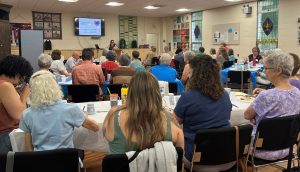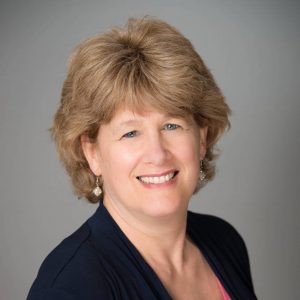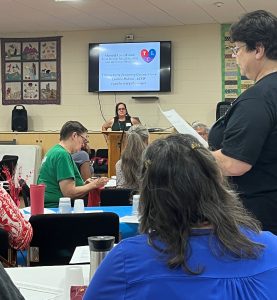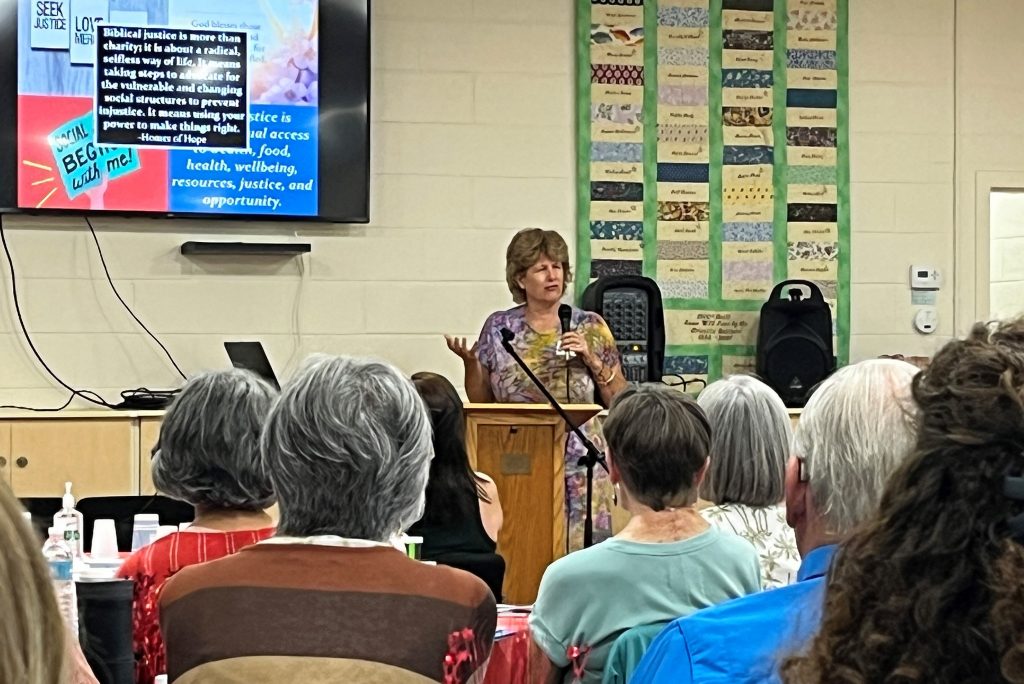Inspired by the Greater New Jersey Conference’s “Journey of Hope,” a growing group of United Methodists have joined together to help churches understand and respond to the need for food justice and racial equity.
 Denville Community Church (UMC), Trinity UMC Hackettstown and Sparta UMC are among many churches that offer food support ministries to their communities, but they also want to do more. Members have gathered twice this year, aided by a generous GNJ Congregational Development grant, to study food justice and move from a mindset of food scarcity to one of abundance.
Denville Community Church (UMC), Trinity UMC Hackettstown and Sparta UMC are among many churches that offer food support ministries to their communities, but they also want to do more. Members have gathered twice this year, aided by a generous GNJ Congregational Development grant, to study food justice and move from a mindset of food scarcity to one of abundance.
In March they focused on the denomination’s Social Principles, approved by General Conference and published by the General Board of Church and Society. They heard from Kayann Foster of CUMAC/ECHO (the Center of United Methodist Aid to the Community/ Ecumenically Concerned Helping Others), which runs Passaic County’s largest food pantry and works to alleviate hunger and poverty.
That initial workshop, titled “Visions of Abundance: Food Justice, Racial Equity and Liberative Mission,” taught them that food scarcity and racial justice are inextricably linked. It inspired their interest in taking on the challenge of addressing the sin of racism, prompted by GNJ’s “Journey of Hope” initiative.
A second, half-day workshop, held on Saturday, July 8, was titled “Shared Abundance: Food Justice, Racial Equity, and Liberative Missions.” It drew more than 40 participants, representing 15 different faith communities and various backgrounds.
 Presenter Connie Palmer, a Certified Lay Speaker who facilitates Social/Emotional Learning Workshops, explored distinctions between justice and charity and the connections between “shared humanity, shared power and shared abundance.” The workshop considered humanity’s solidarity, also called Ubuntu (Bantu for “I am because we are”), and its role in ministries that work for food justice and liberative mission.
Presenter Connie Palmer, a Certified Lay Speaker who facilitates Social/Emotional Learning Workshops, explored distinctions between justice and charity and the connections between “shared humanity, shared power and shared abundance.” The workshop considered humanity’s solidarity, also called Ubuntu (Bantu for “I am because we are”), and its role in ministries that work for food justice and liberative mission.
In evaluations, attendees revealed new understanding of the important topic of food justice. “I learned that I need to change and transform myself so that I can help others,” wrote one attendee. “I have begun to understand the difference between ‘servant’ and ‘volunteer,’” wrote another.
Other shared insights included:
- Charity is giving food. Justice is changing the systems that keep some people from access to food and the ability to buy it for themselves.
- Charity is temporary; justice is permanent. Which will we choose?
- Charity is about me. Justice is about we.
 The GNJ Conference grant also funded development of “Do What You Have the Power to Do,” a curriculum available to everyone that centers on issues related to food justice for all. The eight-week small-group curriculum comes with preaching and worship ideas and resources. To receive a copy, register here.
The GNJ Conference grant also funded development of “Do What You Have the Power to Do,” a curriculum available to everyone that centers on issues related to food justice for all. The eight-week small-group curriculum comes with preaching and worship ideas and resources. To receive a copy, register here.
The three churches will host training sessions August 19 and 26 for anyone wishing to facilitate the curriculum. The Saturday trainings will help facilitators who order and receive the curriculum (a prerequisite) to move from didactic instruction to offering learners transformative experiences.
“What I think is special is that they not only want to learn and equip themselves,” said the Rev. Eunice Vega-Perez, Skylands District Superintendent, “but they feel the need to invite churches from around our district and region to join them in learning about food justice and making a real difference in people’s lives. All of us can do something to fight against hunger.””
By mid-winter, the GNJ grant will be used to subsidize an educational visit to Washington DC for those who finish the curriculum and want to explore next steps in advocacy for justice.
For more information, contact Sandy Svenningsen at sandra.svenningsen@gmail.com.
Thanks to Sandy Svenningsen, who provided content for this story.

